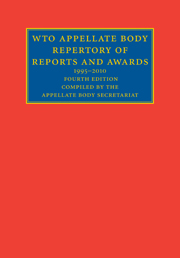Book contents
- Frontmatter
- Contents (outline)
- Contents (detail)
- Foreword to the 1995–2010 edition
- Part I Appellate Body Reports
- A
- B
- C
- D
- E
- F
- G
- H
- I
- J
- L
- M
- N
- O
- P
- R
- S
- T
- V
- W
- Part II Arbitration Awards under Article 21.3(c) of the DSU
- Annex A Terms of Office of Current and Former Appellate Body Members and Chairpersons – 31 December 2009
- Annex B Biographies of Current and Former Appellate Body Members
- Annex C Information on Appellate Body Reports – 1996 to January 2010
- Annex D Arbitration Awards under Article 21.3(c) of the DSU – 1996 to 2009
- Annex E Articles of Covered Agreements Addressed in Appellate Body Reports
- Annex F Working Procedures for Appellate Review WT/AB/WP/61
- Abbreviations used in the Table of References to the Covered Agreements and other Instruments and in the Indexes
- Table of References to the Covered Agreements and other Instruments by Article
- Index
- Subject Index by Case (Appellate Body reports)
- Subject Index by Case (Arbitration Awards under Article 21.3(c) of the DSU)
B
from Part I - Appellate Body Reports
Published online by Cambridge University Press: 05 June 2012
- Frontmatter
- Contents (outline)
- Contents (detail)
- Foreword to the 1995–2010 edition
- Part I Appellate Body Reports
- A
- B
- C
- D
- E
- F
- G
- H
- I
- J
- L
- M
- N
- O
- P
- R
- S
- T
- V
- W
- Part II Arbitration Awards under Article 21.3(c) of the DSU
- Annex A Terms of Office of Current and Former Appellate Body Members and Chairpersons – 31 December 2009
- Annex B Biographies of Current and Former Appellate Body Members
- Annex C Information on Appellate Body Reports – 1996 to January 2010
- Annex D Arbitration Awards under Article 21.3(c) of the DSU – 1996 to 2009
- Annex E Articles of Covered Agreements Addressed in Appellate Body Reports
- Annex F Working Procedures for Appellate Review WT/AB/WP/61
- Abbreviations used in the Table of References to the Covered Agreements and other Instruments and in the Indexes
- Table of References to the Covered Agreements and other Instruments by Article
- Index
- Subject Index by Case (Appellate Body reports)
- Subject Index by Case (Arbitration Awards under Article 21.3(c) of the DSU)
Summary
(WT/DS90/AB/R)
We agree with the Panel that the AdNote, and, in particular, the words “would thereupon produce”, require a causal link of a certain directness between the removal of the balance-of-payments restrictions and the recurrence of one of the three conditions referred to in Article XVIII:9.…
(WT/DS90/AB/R)
We also agree with the Panel that the AdNote and, in particular, the word “thereupon”, expresses a notion of temporal sequence between the removal of the balance-of-payments restrictions and the recurrence of one of the conditions of Article XVIII:9.…
(WT/DS90/AB/R)
…we are of the opinion that the use of macroeconomic policy instruments is not related to any particular development policy, but is resorted to by all Members regardless of the type of development policy they pursue….
…
We believe structural measures are different from macroeconomic instruments with respect to their relationship to development policy. If India were asked to implement agricultural reform or to scale back reservations on certain products for small-scale units as indispensable policy changes in order to overcome its balance-of-payments difficulties, such a requirement would probably have involved a change in India’s development policy.
- Type
- Chapter
- Information
- WTO Appellate Body Repertory of Reports and Awards1995–2010, pp. 246 - 274Publisher: Cambridge University PressPrint publication year: 2011



